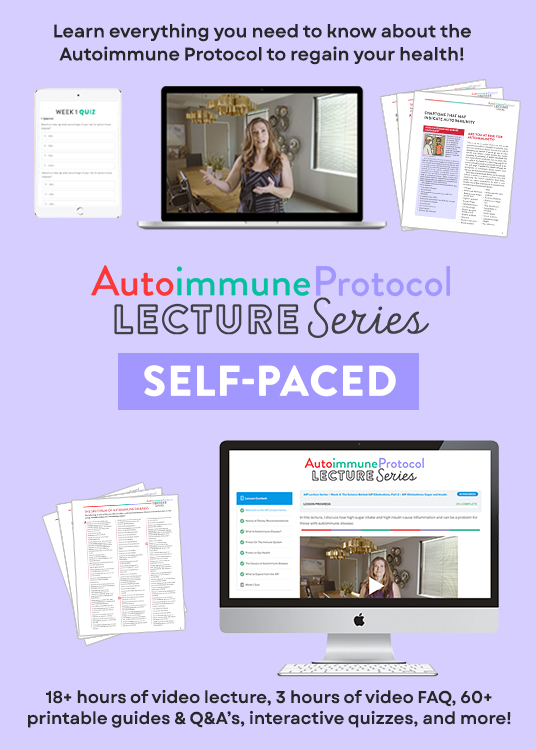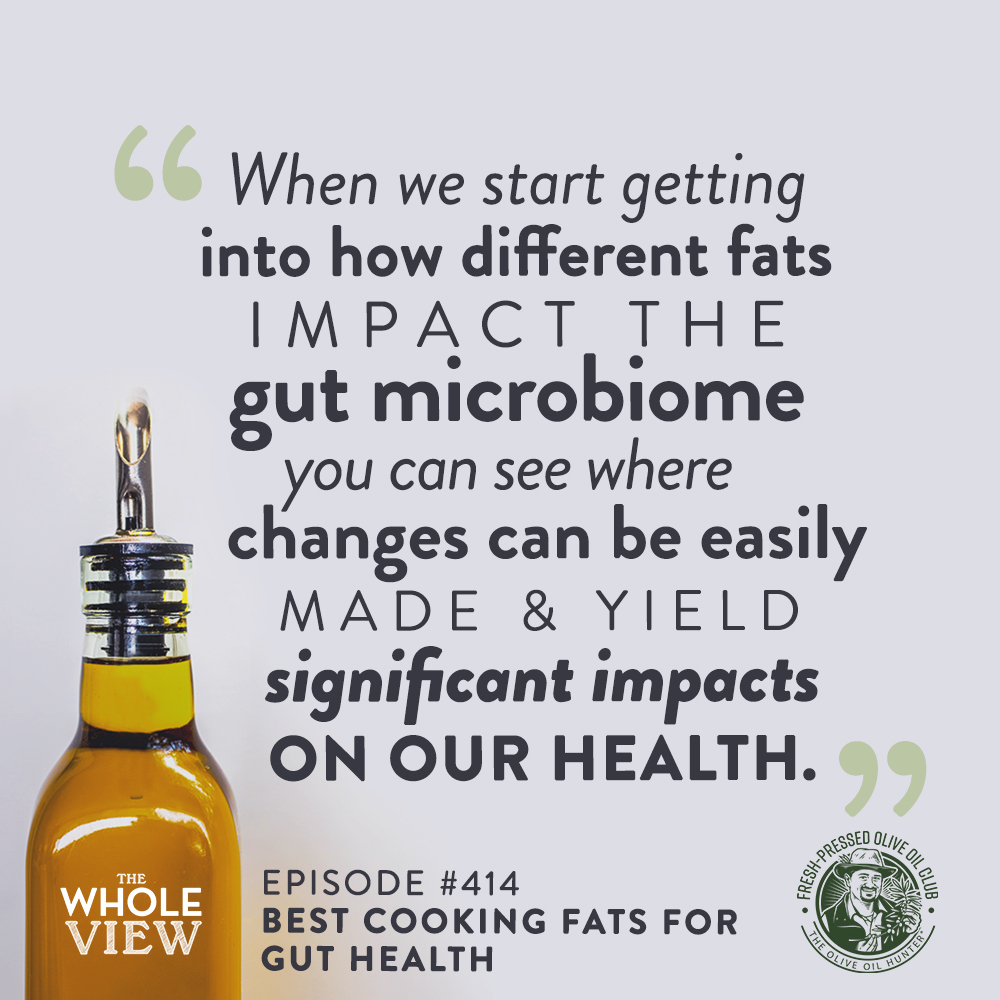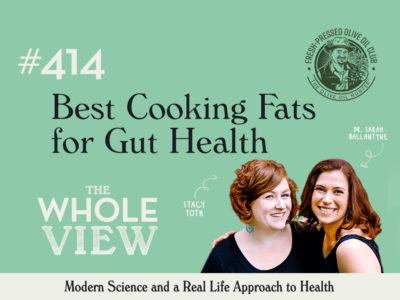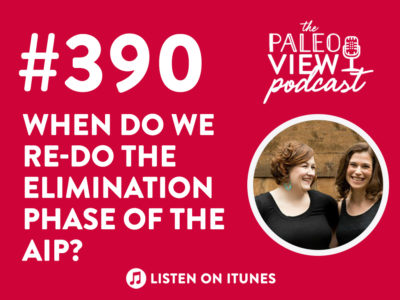Welcome to episode 414 of The Whole View. On this week’s episode, Stacy and Sarah rate the various fat sources and discuss which fats best support a healthy gut microbiome. What should our fat intake look like? Which are best to cook with? All of this and more below!
If you enjoy the show, please review it on iTunes!
The Whole View, Episode 414: Best Cooking Fats for Gut Health
Welcome back to the Whole View, episode 414. (0:27)
Stacy is super jazzed because we are talking about cooking fats this week, and last week she was super into the facts Sarah shared.
We dove superdeep into the details on nut intake and gut health last week, and Stacy looks forward to breaking down the same science as it pertains to cooking fat.
Stacy doesn’t have a gallbladder, which makes cooking fats a sensitive subject for her.
Thank you to our returning sponsor, the Fresh Pressed Olive Oil Club.
Sarah and Stacy shared their love for the Fresh Pressed Olive Oil Club and how this company selects their harvests for their featured olive oils.
The Fresh Pressed Olive Oil Club is a home delivery service of ultra-premium, fresh-pressed, independently lab certified 100% extra virgin olive oil (EVOO).
You can visit this link to try your first bottle for free if you cover the $1 shipping fee.
There is no obligation or commitment to buy anything, now or ever.
On any oils you do buy, there’s always a 100% money-back guarantee and you never have to return a bottle to receive your refund.
Save 70% Off the AIP Lecture Series!
Learn everything you need to know about the Autoimmune Protocol to regain your health!
I am loving this AIP course and all the information I am receiving. The amount of work you have put into this is amazing and greatly, GREATLY, appreciated. Thank you so much. Taking this course gives me the knowledge I need to understand why my body is doing what it is doing and reinforces my determination to continue along this dietary path to heal it. Invaluable!
Carmen Maier

To learn more about them and olive oil, check out this podcast episode.
Brand Validation
Stacy wants to remind listeners, please be mindful of the quality of the oils you are purchasing. (8:03)
We specifically choose sponsors because Stacy and Sarah are sharing about brands that they personally have used, loved, and validated.
Do your research before buying olive oil off your grocery store shelves.
Stacy and Sarah have done their research on this and appreciate that the Fresh Pressed Olive Oil Club has offered such a great deal for our listeners.
We enjoy these olive oil hunter picks, have for years, and know you will too!
The Control Center – the Gut Microbiome
While completing the research for her Gut Microbiome book, Sarah worked hard to not take any bias with her. (10:22)
She tried to simply look at the science and not think about Paleo, AIP, or her food tolerances and intolerances.
What does the science say about how this food or contents in this food impacts the gut microbiome?
When we start getting into how different fats impact the gut microbiome you can see where changes can be easily made and yield significant impacts on our health.
Our gut microbiome literally controls everything.
Gut bacteria control our immune systems, our neurotransmitters, our hormones, and the gut barrier.
So whatever we can do to support a healthy gut microbiome is going to directly impact our health.
It turns out that our gut bacteria are sensitive is more to fiber intake.
They are very sensitive to the types of protein and fats we are consuming as well.
The bacteria that we are trying to grow love it when we consume lots of omega 3’s, monounsaturated fats, and CLA.
They don’t like omega 6’s or saturated fats.
By simply changing your fat sources, you can see huge dramatic shifts in gut microbiome composition and in metabolic activity in a short amount of time.
Quantity
As a general rule, we want to be consuming the healthiest fats for our gut microbiome. (14:26)
However, we don’t want to go crazy on fats.
The best range for overall health is about 20 to 35% of total calories from fats.
This is considered fats in moderation.
Cooking Fats
Fish oil would be the best fat source, but you are not going to cook with fish oil. (15:46)
We are going to assume that fish oil is either a supplement or you’re eating fish.
So the things you actually cook with, olive oil, especially a high quality extra virgin olive oil is the best fat choice for the gut microbiome.
There is not a ton of science looking at avocado oil.
We can infer that it is probably second best based on its similarity to EVOO, but more research is needed here.
Extra virgin coconut oil is probably the third best, but the science on this fat source is very contradictory.
It is best to use coconut oil in moderation instead of making it the go-to.
Grassfed butter and ghee receive fourth-place status, but you should absolutely use these in moderation.
There are no studies looking at pastured lard or grass-fed tallow, so we only have studies looking at conventional.
These studies tell us that these are definitely fats to reserve for occasional use.
Same with palm oil and palm shortening, they get an occasional use score.
Vegetable oils are seed oils that are best avoided completely.
More on EVOO
There has been a ton of science looking at olive oil-enriched diets and comparing it to other fats. (18:31)
Studies have even looked at extra virgin olive oil versus refined olive oil.
Sarah shared a bit about the gut microbiome and how we are measuring changes to gut health, and what is defined as improvements when researching changes.
When you look at EVOO compared to other fats you see that the best microbiome profile occurs with EVOO.
You can correct gut dysbiosis by adding EVOO, which is a spectacular data point.
Refined olive oil is still beneficial, but not as good as EVOO.
High-quality olive oil is high in monosaturated fats, vitamin E, and polyphenols.
It is probably this collection of beneficial compounds that are responsible for all of these benefits.
These impacts on the gut microbiome are sufficient to explain why olive oil again and again in studies is linked to better cholesterol and lower risk of cardiovascular disease.
Cooking with EVOO
We have three listener questions in our queue on cooking with olive oil. (24:33)
There is a myth that olive oil has a really low smoke point, but it doesn’t actually.
High-quality olive oil can have a smoke point as high as about 410 degrees Fahrenheit, which is higher than most cooking applications.
This is because it is packed full of different antioxidants that protect the fats from getting damaged in high heat.
Sarah shared on the studies that have been done to test EVOO’s smoke point.
We know that olive oil actually, especially when it is high quality, is very stable at high heats for prolonged periods of time.
This is thanks to the same things that are good for the gut microbiome.
Olive oil is one of the most heat-stable fats we can choose.
Stacy pointed out that there is more than one way to look at things.
When we find science that is different from our beliefs it is important to still read the science, learn from it, and evolve accordingly.
It is always important to evolve as you learn new things.
Avocado Oil
With avocado oil, there are studies looking at the gut microbiome in whole avocado enriched diets. (30:48)
These show benefits to the gut microbiome, the metabolism, and gut barrier function.
However, when you are looking at whole avocados you are looking at a high fiber food that is also high in vitamin E that are all good for the gut microbiome.
Right now the science doesn’t allow us to separate out how much of that good stuff is making it into high-quality avocado oil.
We can infer because of the similarity of composition that it is probably pretty good.
Sarah doesn’t use avocado oil very often anymore.
Stacy uses avocado oil a lot in baking since EVOO has such a strong flavor profile.
Coconut Oil
When you dig into the science we see these two different effects on a high-quality coconut oil versus a refined. (35:18)
There have been studies using high-quality coconut oil at 20% of the total calories that shows improvements to the gut microbiome.
The science with refined coconut oil-enriched diets, comparting them to diets with soybean oil, showing that there are some potential problems.
There are still some benefits to our gut microbiome, but we do start to see some potential pathogens as well.
Sarah feels that there are two interpretations that can be made at the same time.
One is that quality matters.
A low dose is probably beneficial, and a higher dose is probably not.
This is why Sarah recommends coconut oil in moderation.
We want to keep our saturated fat intake to 10 to 15% of the total calorie range that science has shown to be a healthful range.
In addition, we want to count medium-chain triglycerides because they are saturated fat.
Coconut oil is something that we want to consume in moderation, and we definitely want to seek out the highest quality that we can.
However, this is something that science could dial into further as we are missing the full picture.
Remember, science is a process – it is not static.
This is where we are today with our understanding of coconut oil.
There are definitely unanswered questions that would help push coconut oil up the list or might push it down the list.
Butter & Ghee
So butter and ghee have a couple of compounds in them when they are high quality and grass-fed. (42:40)
One of the things that they have is CLA, which is a naturally occurring trans-fatty acid that is associated with all kinds of health benefits.
Grassfed dairy has about 5x more CLA than conventional.
CLA is also very beneficial for the gut microbiome.
It has been shown to partially counteract the negative effects of a high-fat diet.
Butter and ghee are also a good source of butyrate.
The studies that have looked at butter (using conventional sources) have generally shown that a high butter diet causes the growth of pathogenic things and also drives inflammation in the gut.
It is a strong argument against conventional butter.
However, we also have to look at the saturated fat levels associated with even grass-fed butter and ghee.
So butter and ghee, only grass-fed and gets an ‘in moderation’ stamp.
Stacy shared her thoughts on taking note of what her body tolerates and how to take a logical approach to formulate your own fat intake and what works best for you.
Sarah also shared a bit about what she has learned about her body over time and which fats she tolerates best and how various fats impact her health.
Lard & Tallow
There have not been studies looking at pastured lard, and we know that lard from pasture-raised pigs is really high in nutrients that are good for the gut microbiome. (51:35)
Looking at the research, lard has been shown to not be good for the gut microbiome.
There have been studies where they have fed animals lard enriched diets and shown that it causes obesity and a diabetes type gut microbiome.
You actually see negative health impacts on the animals from that.
It increases intestinal permeability and a higher level of endotoxemia.
This encompasses palm oil as well.
What we don’t know, because these studies have been done in refined palm oil, is if pastured raised lard would have a different effect on our health.
The data that we have now is concerning enough that Sarah only uses these fats when the cooking application requires this chemistry.
For instance, Sarah uses lard on pie crust.
These fats have been demoted in Sarah’s mind.
For a long time, lard was Sarah’s go-to.
We know that the fat is healthier when the animal is healthier, but we still don’t know what that does to our body.
Stacy still encourages everyone to eat nose to tail if you can.
You can still find ways to make them work for you.
Matt and Stacy use lard to fry things at this point.
This is not a fat source they use every day.
Stacy took a moment to give a plug for the air fryer.
As a result, they really don’t fry in lard anymore since they use their air fryer so much these days.
Vegetable Oils
It is no surprise to our listeners that vegetable oils are awful for the gut microbiome. (1:00:44)
They are literally toxic to probiotic bacteria.
Sarah shared on the mechanism behind this.
These oils also have no nutritive value.
We are still going to avoid these oils.
Concluding Thoughts
The conclusion is that olive oil is the best. (1:03:13)
Stacy encouraged listeners to be mindful of the kinds of fats that are on the ingredients lists of the products you purchase.
Take note of the premade things you are purchasing and how often you are consuming them.
If you are doing the things that we talk about on this show, then having one of those premade foods might not be that impactful to your gut-biome.
Stacy wants to remind people that these toxic fats hide everywhere.
It is easy to swap out these products.
The factors that are influencing gut microbiome composition are additive and complex and are sensitive to many variables.
This is about understanding those variables as best as we can and making the best choices that we can.
There is no reason for stress to go crazy in order to find the replacement food for products with less than ideal fats in them.
Troubleshoot where possible.
The occasional bad choice is not going to kill all of our gut bacteria.
Our gut eco-system is more resilient than that.
Optimize choices and make as many good choices as you can, and remember that it is the sum total of all of these different things that are important.
A little bit of bad in a context of overwhelming good is going to be tolerable.
Stacy wanted to clarify that you are not good or bad defined by the choices you make.
This is a no-judgment zone, but we want to empower you with information to make those choices for yourself.
If you decide to add more olive oil to your daily routine or how you eat, we encourage you to check out Fresh Pressed Olive Oil.
Visit this link to get your first bottle for just $1, which helps to cover the cost of shipping.
If you decide to stay on with their subscription, you can see what other kinds of artisanal oils will be shipped your way.
Special Announcement
We have been teasing for a long time that we had something up our sleeve. (1:10:27)
You can now support the show through Patreon membership, which you can do by visiting this link.
We have this monthly audio compilation for you that is going to be our uncensored thoughts on each episode.
This will be unfiltered content.
Maybe don’t listen to this bonus audio with kids around.
It is meant to be a behind the scenes additional commentary compiled monthly.
Sarah is really excited to be able to provide this extra window into our thoughts to longtime listeners who are excited to get even more.
This is a way for Stacy and Sarah to connect with listeners in a really authentic way.
Stacy and Sarah try to really limit the way that sponsors are incorporated into the show, and this provides a way for you to support the work we are doing and the content we are sharing and the costs that go into producing this show.
Again, you can check this out here.
We hope to have this bonus content launch this week.
Thanks for listening and we will be back again next week! (1:14:05)










